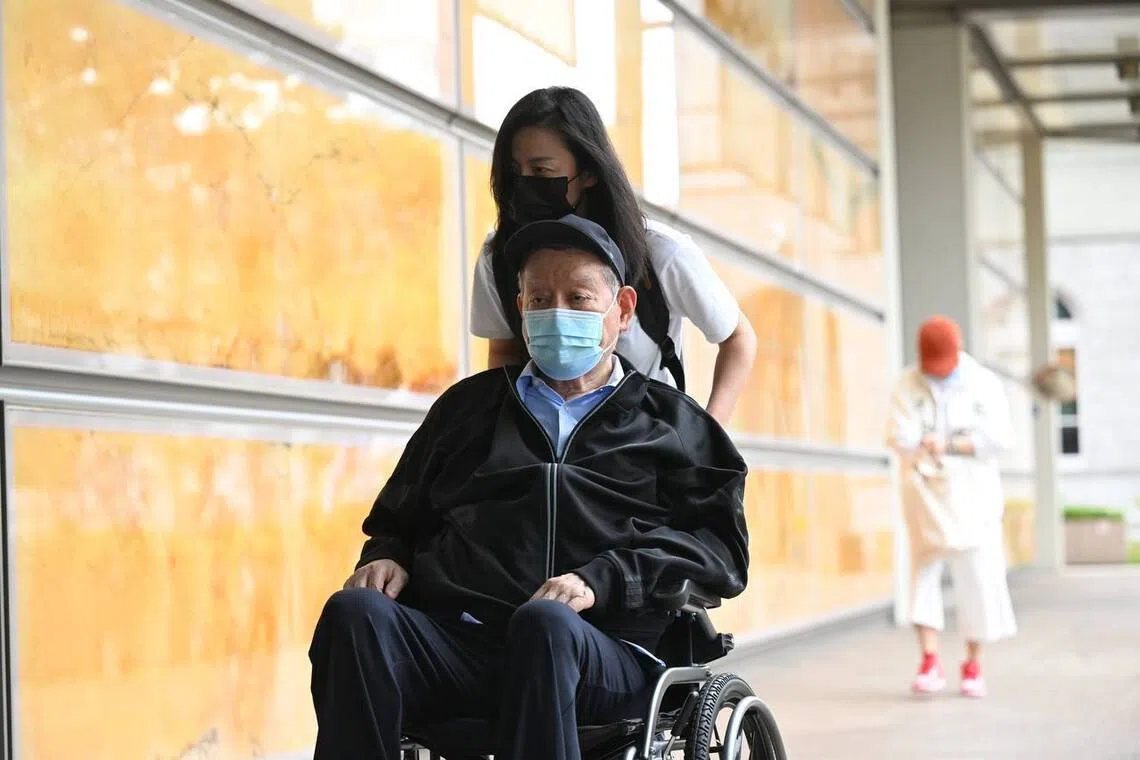Defence lawyer says judge erred in convicting O.K. Lim of cheating; prosecution disagrees
Sign up now: Get ST's newsletters delivered to your inbox

Hin Leong founder Lim Oon Kuin was earlier found guilty of cheating HSBC through employees of his “family business”.
ST PHOTO: CHONG JUN LIANG
Follow topic:
SINGAPORE – The criminal trial judge erred in convicting Hin Leong founder Lim Oon Kuin of cheating and forgery charges, Senior Counsel Davinder Singh said, arguing for his client’s appeal against his prison sentence at a High Court hearing on Oct 24.
The 83-year-old had earlier been sentenced to 17 years and six months’ jail
Lim, a legend in Singapore’s oil industry, in November 2024 appealed against the conviction and sentences imposed, with his lawyers seeking a seven-year jail term.
They argued that, given his age, a 20-year sentence, which the prosecution sought, was akin to a life sentence.
Even with a one-third remission of his sentence, Lim would be released from prison only when he is 94 or 95 years old.
On Oct 24, Mr Singh told High Court Justice Hoo Sheau Peng there was no evidence that the former oil tycoon – better known as O.K. Lim – had given instructions to Hin Leong staff to submit fraudulent discounting applications to HSBC to induce the bank into disbursing some US$111.6 million (S$145 million) to the oil trader.
He also argued there was no evidence that the amounts of money stated in the charges were delivered.
Lim was found guilty of cheating HSBC through employees of Hin Leong. The court found that he had directed staff to submit fraudulent documents for the discounting of non-existent oil sales with China Aviation Oil (Singapore) (CAO) and Unipec Singapore.
But Mr Singh, in arguing against Lim’s conviction, maintained that “there’s no evidence that Lim instructed anyone to submit the CAO or Unipec documents to HSBC”.
“When Ms Katherine Ong (a former accounts executive at Hin Leong) took the stand, she said she was unable to remember whether she received instructions from Lim or whether it was Serene Seng,” he said. Madam Seng was Lim’s former personal assistant.
But Deputy Chief Prosecutor Christopher Ong disagreed, saying that it was “not necessary for the prosecution to show Lim gave instructions to employees each step of the way” in the submission of the forged documents.
“The fact is that as the evidence came out, it’s not the case that Katherine Ong said nobody gave her instructions. She is just not clear who did,” he said.
“The important point is who started the ball rolling... The evidence points to the fact that Lim was the one who started the ball rolling,” he added.
Justice Hoo also asked the prosecution to address the defence’s argument that it was unclear what the documents for the two transactions were to be used for and whether they were to be sent to HSBC.
DCP Ong said: “It is quite clear that (Lim) meant for the discounting applications to be submitted.”
The lower court also found that HSBC was deceived into disbursing US$111.6 million to Hin Leong, of which US$85 million remains its total outstanding loss.
But Mr Singh disagreed, saying: “The money wasn’t delivered to anyone. The bank paid itself from the monies it agreed to discount.”
He said: “This account was in an overdraft. At the time the monies came in, Hin Leong owed HSBC amounts which the credited monies wiped out... There’s no evidence of Hin Leong taking delivery of the monies and benefiting from it.”
But the prosecution said: “That’s completely inaccurate.”
DCP Ong said: “The only reason the overdraft could be set off by those sums was because the monies were credited by HSBC into the account.
“While it may be true that HSBC would ultimately have benefited if the transactions turned out to be genuine, in that it reclaimed some monies, Hin Leong benefits because it faces a reduced debt owed to HSBC.”
State Courts District Judge Toh Han Li, in his November 2024 oral decision, noted that these were “staggeringly large sums of monies relative to other cheating cases which have come before our courts”.
He also found that a deterrent sentence was warranted “to prevent offences from pervading Singapore’s financial ecosystem, which may lead to banks imposing stricter rules of compliance or withdrawing their trade financing services entirely”.
On the weight that should be given to Lim’s evidence for his sentencing, DCP Ong said the only conclusion that could be drawn from his testimony was that he was an “unreliable witness”, given that he did not just correct his statements to the police once, but several times.
“(Lim) cannot have it both ways. He cannot say he was confused at the time his statements were given and yet remember with great specificity what he told the investigating officer,” he added.
DCP Ong said: “The defence will have the court accept that (Lim) had nothing to do with the transactions, and that it was a group of employees who embarked on this pursuit, led by Serene Seng. But why would the employees do such a thing when the benefit went to Hin Leong?
“On the other hand, you have (Lim), whose company faced margin calls (and financial collapse) and (who) gave instructions for the transactions to be done to fix these problems. He had told Serene not to worry... (But Lim) is now trying to evade responsibility for what he has done.”


